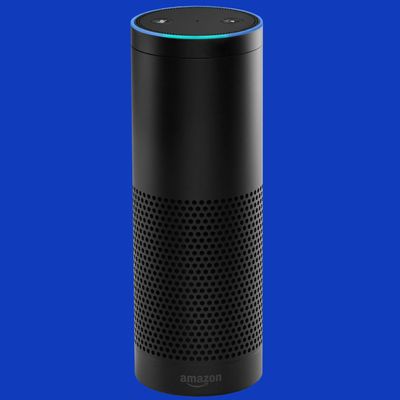
The Echo, Amazon’s voice-enabled speaker-assistant, is maybe the most talked-about (and talked-to) new gadget since the iPhone. It’s futuristic, it’s weird-looking, it’s extremely useful, and you should buy one.
Really?
Yes. I mean — maybe you live off the grid or something; I don’t know. But if you’ve got electricity and internet access and disposable income to the tune of 130 bucks, the Echo is a genuinely great gadget that will be useful in basically any home.
My life is basically fine without an Echo.
Sure. It would be easy to keep living without an Echo. And, look, it won’t solve any particular problems for you. But it’s not supposed to. All it really does is make your life just a little bit easier, in ways that you don’t really start to appreciate until you’ve had it in your house for a while.
What do you mean?
Take checking the weather. This is a task that has been made increasingly easier over the last two decades, to the point of being, more or less, the easiest thing you can do on an iPhone: You just have to swipe down, and your weather widget will show you the temperature.
But taking out your phone, and swiping, and reading is still more complicated than asking Alexa: “Alexa, what’s the weather like today?” It sounds ridiculous if you haven’t used it, I know. I’m embarrassed to even type it! But after a few days of using Alexa to check your weather — from bed! In front of the closet! On your way out the door! — using your phone starts to feel like an enormous burden.
This just sounds like a lazy man’s enabler.
When you consider the number of things Alexa allows you to do while doing something else — setting a timer while putting food in the oven; ordering more toothpaste while finishing the last tube; putting on a playlist while setting up for a party — you could potentially make the argument that the Echo actually saves you time and makes you more efficient. But, honestly, my answer is: Why not enable your laziness?
Still: All the things it does are so minor. Why spend money on it?
The slightness of its chores, in my experience, is the whole point. Think of every basic daily fact you’ve Googled and every task you’ve launched from your iPhone’s bottom drawer. All that stuff can be done, with less effort, and with more use, by Alexa. That’s not just a collection of small features — it’s a whole category of service. Plus, figure you’re already going to spend about half that on a Bluetooth speaker of equivalent quality, so really, you’re spending the difference on the services.
What kinds of “services” do you mean?
Want to call an Uber? Install the Uber skill, and you can just ask Alexa to hail you one. Or install the “Weather Sky” skill to ask it to give you a rain forecast down to the minute. You can ask it to give you a “flash briefing” in the morning — a news summary from the radio station of your choice. You can use it as the control module for your smarthome (I have it hooked up to the Phillips Hue bulbs in my house, so I can say “Alexa, turn off the lights” as I leave.) If you’ve got a Spotify or Amazon Music account, the Echo is almost worth it just for the ability to say, “Alexa, play ‘I Can’t Make You Love Me’ by Bonnie Raitt” and listen as the sound of Bruce Hornsby’s piano emerges from the speaker, without you having to touch your phone or computer at all.
What about privacy concerns?
In order for it to hear you say “Alexa,” the Echo has to be always one, and therefore always “listening” — and there are some very good reasons to not want an internet-connected listening device in your home. Still, the speaker doesn’t send anything it “hears” to Amazon until you say the word Alexa, and the company only stores recordings of the orders you give Alexa for a limited period of time, and you can delete those recordings at any time. Of course, yes, that requires you to trust Amazon. But consider that if you’re carrying a smartphone around you’re already carrying a listening device with you at all times.
Well, does it work?
Yes! Vastly better than the current form of Siri. This is the real selling point: It works extremely well. Space-station-AI well. Robot-butler well. Future-of-tech well. And definitely worth-your-money well.
Heads up: If you buy things through our links, New York Magazine may get a cut of it. That said, we don’t recommend products we wouldn’t use — or in this case, haven’t already bought for ourselves.





























